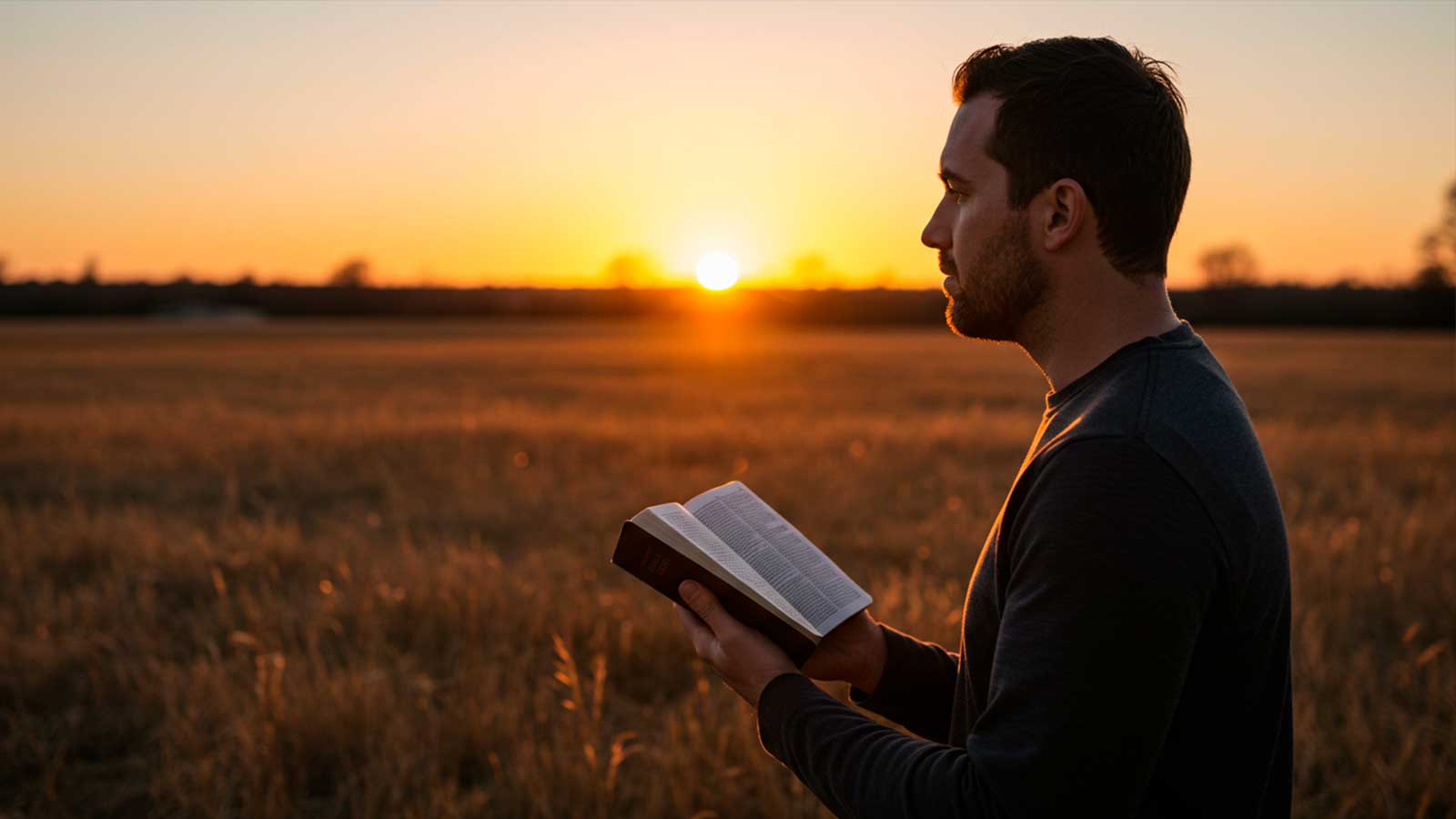Psalm 49 is a powerful call to wisdom. Unlike many other psalms, it is not a direct prayer to God but a deep meditation addressed to all humanity. In it we find an invitation to reflect on the meaning of life, the destiny of the rich and the poor, and the true value of the soul. This psalm presents eternal truths that remain relevant today.
Let’s explore the full content of Psalm 49 together, analyzing its main themes and applying its messages to modern contexts of faith, values, and choices.
Psalm 49 Complete
¹ Hear this, all you peoples; listen, all inhabitants of the world.
² Both low and high, both rich and poor alike.
³ My mouth will speak words of wisdom; the meditation of my heart will bring understanding.
⁴ I will incline my ear to a proverb; I will expound my riddle on the harp.
⁵ Why should I fear in evil days, when wickedness surrounds me and enemies set traps?
⁶ Those who trust in their wealth and boast of the multitude of their riches,
⁷ None of them can in any way redeem a brother or give God a ransom for him.
⁸ (For the redemption of a soul is costly, and must be left forever),
⁹ So that he might live on forever and not see decay.
¹⁰ For he sees that the wise die; likewise the fool and the senseless perish and leave their wealth to others.
¹¹ Their inner thought is that their houses will last forever and their dwelling-places from generation to generation; they name their lands after themselves.
¹² Yet man in honor does not remain; he is like the beasts that perish.
¹³ This is their way, their folly; yet their descendants approve their sayings. (Selah.)
¹⁴ Like sheep they are appointed to Sheol; death shall shepherd them, and the upright will rule over them in the morning; their beauty shall waste away in the grave, far from their mansions.
¹⁵ But God will redeem my soul from the power of the grave, for He will receive me. (Selah.)
¹⁶ Do not be afraid when someone becomes rich, when the glory of his house increases,
¹⁷ For when he dies he will carry nothing away; his glory will not follow him.
¹⁸ Though in life he blessed himself—and people praise you when you prosper—
¹⁹ He will go to the generation of his fathers; they will never again see the light.
²⁰ Man in honor, yet without understanding, is like the beasts that perish.
Complete Explanation of Psalm 49
Psalm 49:1
“Hear this, all you peoples; listen, all inhabitants of the world,”
This verse opens with a universal call to attention. The psalmist addresses all humanity, inviting every people and nation to hear his message.
Psalm 49:2
“Both low and high, both rich and poor alike.”
The scope of the invitation becomes even clearer. The psalm’s message is intended for everyone, regardless of social standing, wealth, or influence.
Psalm 49:3
“My mouth will speak words of wisdom, and the meditation of my heart will bring understanding.”
The psalmist declares that his words come from wisdom and deep meditation. He speaks not out of vanity but with discernment and purpose.
Psalm 49:4
“I will incline my ear to a proverb; I will expound my riddle on the harp.”
The psalm will be presented poetically and enigmatically, aided by music. This adds symbolic depth to its message.
Psalm 49:5
“Why should I fear in evil days, when wickedness surrounds me and enemies set traps?”
Even in difficult times and under threat from enemies, the psalmist expresses confidence, questioning the reason for fear in the face of evil.
Psalm 49:6
“Those who trust in their wealth and boast of the multitude of their riches,”
The critique now turns to those who rely solely on wealth. They take pride in their possessions, forgetting they are temporary.
Psalm 49:7
“None of them can in any way redeem a brother or give God a ransom for him”
No amount of money can purchase a soul’s salvation. Redemption is beyond human power.
Psalm 49:8
“(For the redemption of a soul is costly, and must be left forever),”
The value of a soul is immeasurable. This salvation lies beyond the capacity of any wealthy or powerful person.
Psalm 49:9
“So that he might live on forever and not see decay.”
No amount of money can prevent death or physical decay. Eternity cannot be bought with material goods.
Psalm 49:10
“For he sees that the wise die; likewise the fool and the senseless perish and leave their wealth to others.”
Death is egalitarian. Whether a person is wise or foolish, rich or simple—everyone shares the same fate and takes nothing with them.
Psalm 49:11
“Their inner thought is that their houses will last forever and their dwelling-places from generation to generation; they name their lands after themselves.”
The rich live under the illusion of permanence, believing their possessions will last forever. Naming their lands is an attempt to eternalize their legacy.
Psalm 49:12
“Yet man in honor does not remain; he is like the beasts that perish.”
Without understanding, man—no matter how honored—dies like any other living creature. Honor without wisdom is useless in the face of death.
Psalm 49:13
“This is their way, their folly; yet their descendants approve their sayings. (Selah.)”
The folly of those who trust in riches is evident, but their descendants keep endorsing that lifestyle, perpetuating the error.
Psalm 49:14
“Like sheep they are appointed to Sheol; death shall shepherd them, and the upright will rule over them in the morning; their beauty shall waste away in the grave, far from their mansions.”
Death is portrayed as a shepherd guiding the wicked to their final destination. Meanwhile, the righteous will inherit true dominion, and the beauty of the rich will fade.
Psalm 49:15
“But God will redeem my soul from the power of the grave, for He will receive me. (Selah.)”
Unlike those who trust in riches, the psalmist places his hope in God. He trusts that he will be saved from death by divine intervention.
Psalm 49:16
“Do not be afraid when someone becomes rich, when the glory of his house increases.”
The directive is clear: do not envy the rich. Their prosperity is temporary and should not be a cause for fear or admiration.
Psalm 49:17
“For when he dies he will carry nothing away; his glory will not follow him.”
Glory and possessions do not pass beyond the grave. In death, everyone is emptied of all they accumulated in life.
Psalm 49:18
“Though in life he blessed himself—and people praise you when you prosper—”
Even if the rich are praised in life and approved by others for their success, it does not alter their eternal destiny.
Psalm 49:19
“He will go to the generation of his fathers; they will never again see the light.”
He will follow the same path as his ancestors, who also died. They will be cut off from the light—a symbol of eternal life and God’s presence.
Psalm 49:20
“Man in honor, yet without understanding, is like the beasts that perish.”
The psalm ends with a powerful lesson. Honor without wisdom saves no one. The true distinction among humans lies in understanding and the fear of God.

The Historical and Literary Context of Psalm 49
Psalm 49 is part of the second book of the Psalter and is attributed to the sons of Korah. Unlike many psalms of lament or praise, this is a true poetic homily. Its structure suggests a public discourse, as if the psalmist were addressing a gathered crowd.
The Sons of Korah and Poetic Wisdom
The sons of Korah were Levites dedicated to music and temple worship. In Psalm 49, they assume the role of wisdom teachers, warning about the deceitfulness of riches and the illusion of material security.
The Central Message of Psalm 49
The essence of Psalm 49 is to confront the illusion of security in wealth and status. The message is clear: no material good can purchase the redemption of a soul. Death levels everyone—rich and poor—and only trust in God provides true hope.
Wealth Does Not Guarantee Salvation
The main critique of Psalm 49 falls on those who trust in material goods as if they were permanent. The psalmist makes it clear that death is inevitable and no fortune can prevent that destiny.
The Eternal Value of the Soul
While material goods are temporary, the soul has eternal value. The psalm states that the redemption of the soul is far too costly for any human being. This points to the need to turn to God, who alone can redeem.
Structure and Poetic Themes of Psalm 49
Psalm 49 can be divided into three main parts: the invitation to listen, the critique of trusting in riches, and the final hope of the righteous.
Invitation to Listen and Reflect
The psalmist begins by inviting all peoples—rich and poor, great and small—to listen to his message. This universal opening highlights that the psalm’s teachings are relevant to everyone.
The Illusion of Wealth and the Reality of Death
The text affirms that even wealthy and influential men cannot escape death. Their graves are their final destination, and their riches will be inherited by others. They live in temporary glory but disappear like sheep delivered to the grave.
Trust in the Lord as the Path of Salvation
In the final part of the psalm, the tone changes. The psalmist expresses his confidence: “But God will redeem my soul from the power of the grave.” Here lies true hope, which is not in gold or glory, but in God.

Practical Applications of Psalm 49
Psalm 49 is extremely relevant to today’s world, where materialism and the pursuit of social status dominate so many lives. Its truths invite us to a profound reassessment of our priorities.
Spirituality Above Appearance
We live in times where outward image seems to matter more than character. Psalm 49 challenges this mindset and reminds us that God sees the heart and values humility, not luxury.
Planning with Wisdom
This is not about rejecting goods or comfort, but about not making them life’s purpose. The psalm guides us to live wisely, remembering that everything is temporary and that the soul is eternal.
Reflection for Leaders and Influencers
The text also serves as a warning to those who influence others. All leadership must be exercised with awareness, for the example of those who trust in riches leads many astray.
Curiosities about Psalm 49
One of the Most Philosophical Psalms in the Bible
Psalm 49 is considered one of the most reflective psalms. It resembles the style of the wisdom books, such as Proverbs and Ecclesiastes, offering a more rational and moral view of life.
Read in Memorial Services and Ceremonies
Because it addresses themes like death, eternity, and the value of the soul, Psalm 49 is often read at funerals and moments of deep life reflection.
Compared to Jesus’ Teaching on Possessions
Many scholars see connections between this psalm and Jesus’ teachings about wealth—such as the parable of the rich fool—showing that a focus on material things is futile in the face of eternity.

The Relevance of Psalm 49 in the Modern World
We live in an era where ostentation is encouraged on social media and the culture of success is tied to money and power. Psalm 49 offers a firm counterpoint to this mentality, proposing wisdom as the path of life.
Tips for Meditating on Psalm 49
- Read the psalm aloud and slowly.
- Ask questions like: In what do I truly trust?
- Meditate on verse 15, which brings a strong message of hope.
- Reflect on how you can live with more purpose and less attachment to material things.
Interpretative Variations of Psalm 49
Traditional Jewish View
In Jewish tradition, Psalm 49 is seen as a call to justice and moral awareness. Equality in the face of death is a common theme in rabbinic texts.
Christian View
In Christianity, the psalm is interpreted as a prefiguration of salvation through God, pointing to the Messiah as the one who definitively redeems the soul.
Frequently Asked Questions about Psalm 49
What is the main theme of Psalm 49?
The futility of riches and hope in divine redemption.
Is Psalm 49 a prayer?
Not exactly. It is a meditation directed to people, not a direct supplication to God.
What is the best-known verse of Psalm 49?
Verse 15 is one of the most quoted: “But God will redeem my soul from the power of the grave…”
What does Psalm 49 teach about death?
That it is inevitable for everyone, regardless of social status or possessions, and that only God offers salvation.
READ ALSO:
- 50 Beautiful Bible Verses to Strengthen Faith and Heart
- Proverbs 15 – Reflections That Transform
- Birthday Message: Biblical Inspiration to Celebrate
FOLLOW US ON FACEBOOK
I hope you enjoyed it.